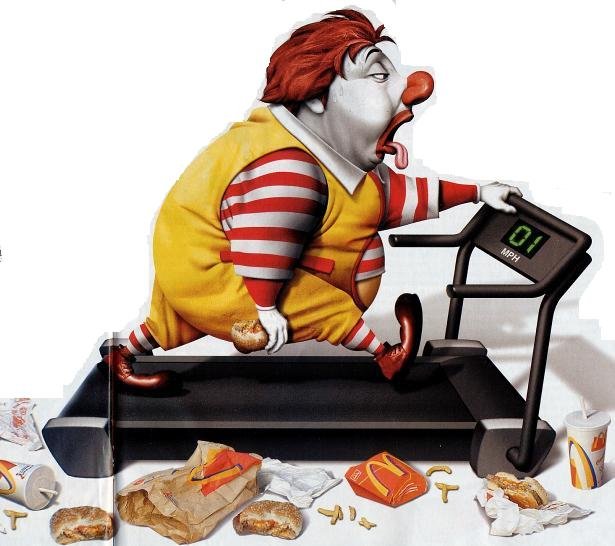IS FAST FOOD SLOWING DOWN?!

Has fast food really slowed down in the last decade?? In the last fifteen years, the fast food industry’s revenues have actually risen twenty percent. However, there is a worthy competitor rising from the ranks and that’s the health food industry. Throughout the nation there has been a rising popularity in organic, vegetarian/vegan, locally farmed, and plant-based diets. Public awareness has also increased with mainstream media’s adoption of the movement. Addressing the corrupt or sometimes quite revolting processes behind the production of fast food meals has become a common discussion in American households. In the words of Fast Food Nation author Eric Schlosser, “the Golden Arches are now the symbol of a fallen empire, like the pyramids at Giza.”
Despite the recent health movement sweeping the nation, the entire organic-food industry’s annual revenue is roughly equivalent to McDonald’s annual revenue. The main reason for this is the high cost for organic foods. The expensive prices, in comparison to the low prices for fast food meals, have created a great social division in America. For the first time in history, the poor are overweight while the rich are thinning down. This has lead to the fast-food chains targeting minorities. Low-income neighborhoods have the highest amount of fast food restaurants per area, and consequently, rising obesity rates. These communities are also specifically targeted through advertising. Passionately put, “The endless barrage of ads, toys, contests, and marketing gimmicks has fueled not only fast-food sales, but also a wide range of diet-related illnesses.” Other targeted demographics for fast-food advertising include children. An average preschool sees about three fast-food advertisements daily, being possibly one of many contributing factors to childhood obesity. The average obesity rate amongst preschoolers has doubled in the past thirty years, and the obesity rate amongst elementary level children has tripled. Despite these depressing statistics, there is impressive and substantial change occurring and if it progresses, health food could quite possibly replace our processed diets.
In the past two to three decades, the money spent on organic food has increased 20-fold. The nation is starting to reject “highly processed foods, genetically modified foods, and the whole industrial approach to food production…” while the media and public are accepting, “…farmers’ markets, school gardens, healthy school lunches, and local and organic production.” There are multiple factors that have contributed to this current improvement. In the 1970s, scientists started associating red meat with cancer and since then the national consumption of red meat has been steadily decreasing. In Fortune magazine, an article states that since “The World Health Organization’s classification of processed meat—bacon, hot dogs and sausage—as a carcinogen and red meat as a “probable” carcinogen is just the latest salvo in the meat-eating debate.” The article includes a chart which visually graphs this decrease in red meat consumption. This study aligns with an article in the Latest Vegan News, which analyzes the drop in overall animal slaughter. The journalists states “In that year (2007), the U.S. raised and killed 9.5 billion land animals for food. As of 2014, that number plummeted by a whopping 400 million.” Even though, 9.1 billion still remains a rather large figure, the recent vegetarian revolution has made a substantial dent in the meat industry.
Fast-food chains are not ignorant to the recent change in social awareness and dietary preferences. As a result some franchises have started to adjust their menus to target the health-driven demographics. The Latest Vegan News addressed a recent change occurring to a major fast-food franchise in a 2015 article. In the article it states “Taco Bell, on the other hand, has just made history as the first-ever QSR (Quick Service Restaurant) to offer menu items certified by the American Vegetarian Association (AVA). The certified items include 13 ready-made menu items, plus 35 a la carte ingredients (26 of which are also vegan).” This has sparked ethical discussions amongst the vegetarian/vegan communities. At one end you are supporting the adoption of animal-friendly, alternative menu changes. On the other hand, your money is still contributing to a business that partakes what many would claim animal cruelty and “poisoned” diets.
Regardless of the ethics associates with Taco Bell’s menu additions, it is refreshing to see change actually taking place within our food industry. For the first time, in many decades, the American people aren’t being handfed information by the food corporations. Whether you are a committed vegan or a full-fledged carnivore, it’s important to know how your food got on your plate. As consumers, we should continue distinguishing nutritional fact from nutritional theory.
Works Cited:
Schlosser, Eric. "Still a Fast-Food Nation: Eric Schlosser Reflects on 10 Years Later." Thedailybeast.com. N.p., 3 Dec. 2012. Web. http://www.thedailybeast.com/articles/2012/03/12/still-a-fast-food-nation-eric-schlosser-reflects-on-10-years-later.html.
Haspel, Tamar. "The Decline of the (red) Meat Industry — in One Chart." Fortune.com. N.p., 27 Oct. 2015. Web. http://fortune.com/2015/10/27/red-meat-consumption-decline/.
Sentenac, Hannah. "400 Million Fewer Animals Were Killed for Food Last Year vs. 2007 Because People Are Eating Less Meat." Latestvegannews.com. N.p., 24 June 2015. Web. http://latestvegannews.com/400-million-fewer-animals-were-killed-for-food-last-year-because-people-are-eating-less-meat/#.
Sentenac, Hannah. "Taco Bell’s New Vegetarian Certified Menu Has 26 Vegan Ingredient Options." Latestvegannews.com. N.p., 1 Oct. 2015. Web. http://latestvegannews.com/taco-bells-new-vegetarian-certified-menu-has-26-vegan-ingredient-options/.